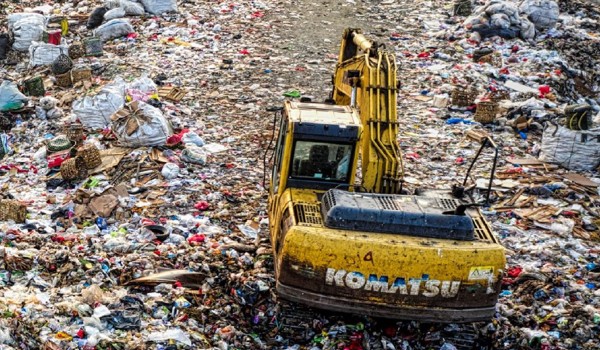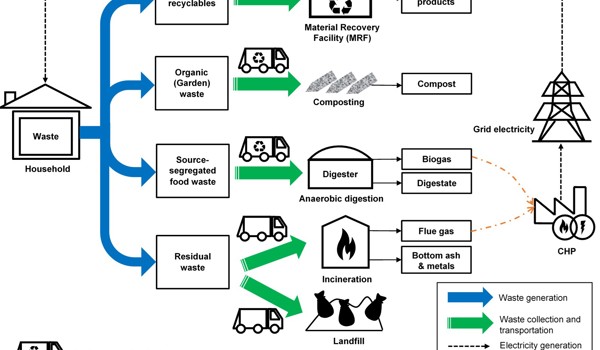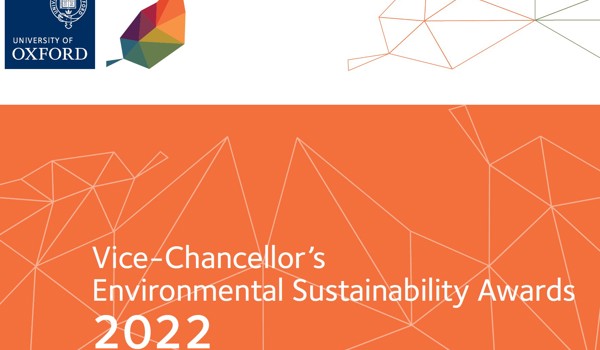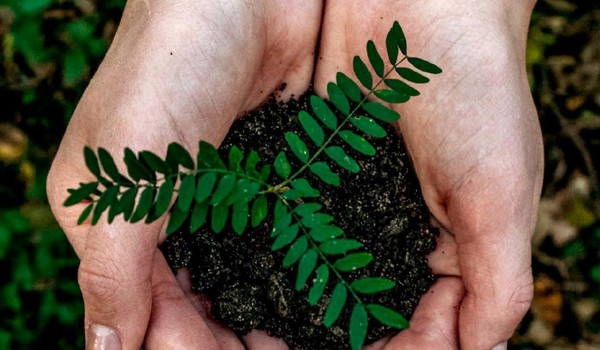01 Jun 2023
SYNERGORS Publishes Report on Sustainable Municipal Solid Waste Management in Malaysia

SYNERGORS has published its second in-house report entitled "Towards Sustainable Municipal Solid Waste Management in Malaysia". The study was led by Dr Kok Siew Ng, Lecturer at Brunel University London and Visiting Researcher at the Department of Engineering Science, University of Oxford. This work was supported by the Natural Environment Research Council (NE/R012938/1) through the UKRI/NERC Industrial Innovation Fellowship Programme. The report can be downloaded via the Publications page on the SYNERGORS website.
Executive Summary
The increasing amount of municipal solid waste (MSW) generation and the lack of strategic improvements on solid waste management in Malaysia require urgently the attention of the government and the public. It has been estimated that 1.17 kg/capita/day of MSW is generated in Malaysia, 65% of which is household solid waste that has doubled over the past 20 years due to population growth and urbanisation. Without a sufficient waste treatment and recycling infrastructure in place, most of the MSW is destined to continue to be landfilled. Not only it can cause pollution and health hazards, MSW is also one of the major sources of global methane emissions accounting for 11%. As methane is the second largest contributor of global greenhouse gas emissions after carbon dioxide, it is critical that Malaysia develops systemic sound solid waste management as part of its climate actions guided by the Parisagreement. Also, by treating waste as resource, the recent shift in the government strategy to move towards the circular economy should be aligned with SDG 12 targets (Responsible Consumption and Production).Although the quantity of recyclable waste collected tripled between 2018and 2021, the officially reported recycling rate of 31.5% in 2021 remains questionable as the recycling infrastructure in Malaysia is not yet well established. This points to the significant efforts Malaysia needs to make to move towards a sustainable waste management regime, and to achieve its ambition for reaching a recycling target of 40% by 2025.
Malaysia started implementing a plan for moving towards sustainable waste management in the early 1990s. However, the recycling programmes were not well received by the public at that time, and it was only in 2001, that policy goals for sustainable waste management have been included in the regulatory landscape through the 8th Malaysia Plan (2001-2005). In 2005, the National Strategic Plan for Solid Waste Management was developed to guide solid waste policy planning and resource allocation. Two years after, the Solid Waste and Public Cleansing Management Act 2007 (Act 672) was created that came into enforcement in September 2011 in six out of the 13 states (Perlis, Kedah, Pahang, Negeri Sembilan, Melaka, Johor) and two out of the three federal territories (i.e. Kuala Lumpur and Putrajaya). This partial adoption of the Act has created inconsistency in waste management and planning as well as incomplete waste data gathering. This, has led to ineffective waste management practices, that, in turn, result in long-term environmental, economic and social consequences. Even though, sustainable waste management goals continue to be included in the recent 12th Malaysia Plan (2021-2025) the lack of public awareness on the importance of source separation of waste and recycling prevents progress in this field. The infrastructure for waste collection and treatment is also insufficient to serve the needs. All these factors have created significant barriers for Malaysia to realise sustainable waste management.
Recommendations
Sustainable waste management requires a systemic approach in minimising waste through prevention, reuse, recycling, recovery and disposal. The proposed recommendations to overcome the barriers in waste management in Malaysia are:
- Improve the way waste data is collected. The current data collection practice should be extended to cover every state in Malaysia. This will give a more comprehensive data set to reflect the actual situation which will enable appropriate measures to be undertaken.
- Create a clear definition of recycling rate to reflect the actual amount of materials that have been recycled instead of considering the “potential” recyclable fraction, which may or may not be recycled.
- Introduce an integrated action plan and streamlining policies and regulations for waste management for the whole Malaysia. Waste collection practices and regulations should be standardised across the country.
- Increase investment and subsidies to upgrade waste infrastructure. This should involve converting all landfills into sanitary landfills; increasing waste-to-energy facilities for residual waste treatment; as well as anaerobic digestion and composting for organic waste treatment.
- Enhance skills and expertise for human resources (e.g. engineers, waste collector) through training.
- Promote public awareness of reduce, reuse and recycling through education and advocacy to foster behavioral changes.
This publication is an extension of “Malaysia versus Waste” authored by Dr Kok Siew Ng and Dr Eleni Iacovidou, featured in The Chemical Engineer (IChemE) in July 2020 (https://www.thechemicalengineer.com/features/malaysia-versus-waste/) to cover a wider aspect of municipal solid waste management in Malaysia. This work is mostly based on literature survey. This publication also serves as a supplementary material for the current 12th Malaysia Plan and future policy making to support the Malaysia’s initiatives in transitioning towards sustainable waste management and circular economy.
SYNERGORS
The SYNERGORS project (“A systems approach to synergistic utilisation of secondary organic streams”) aimed to develop new systems approaches for promoting resource recovery from secondary organic waste streams including food waste, residual biomass and municipal solid waste. The project received support from more than 10 UK and international organisations, including academia, industry and policymakers, to provide multidisciplinary expertise to address the global challenges in resources and waste management. The formation of the core team was greatly assisted by the British Council / Newton Fund Researcher Links workshops, with collaboration between the British, Malaysian, Mexican and Brazilian academics.





